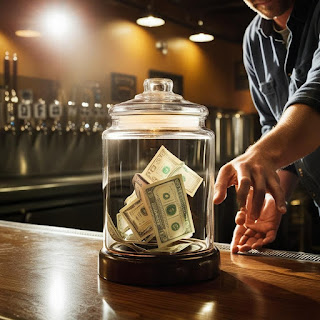 Here's a tip for management — keep your hands off of your employees' tips.
Here's a tip for management — keep your hands off of your employees' tips.A recent case filing by class of employees against a cannabis company accusing management of pilfering their tips. The Department of Labor and the Fair Labor Standards Act, however, are crystal clear: tips belong to the workers who earn them, period.
The FLSA says that managers and supervisors are on the banned list when it comes to taking employees' tips. That means whether it's a tip jar, a pooled collection, or a customer slipping a few extra bucks to their favorite server, that cash legally belongs to the employees — not to anyone who wear the "management" hat. There is one tiny exception: if a manager personally provided the service that earned the tip (say they stepped in to serve a table or pour a drink and were personally handed the tip), they can keep it. But otherwise? Hands off.
This is a costly mistake for businesses to make. If a business is caught with its hand in the tip jar, it could be on the hook for twice the amount taken, plus attorneys' fees. No one should want to explain to a judge why they thought it was okay to swipe tips from hard-working servers, bartenders, or baristas.
The bottom line? Let your employees keep what they've earned. Their tips are not your piggybank. They're the ones who dealt with the spilled drinks, the long hours, and the customer who sent their meal back twice. Give them what's rightfully theirs — they've more than earned it. And you'll save yourself a lot of legal headaches in the process.
The FLSA says that managers and supervisors are on the banned list when it comes to taking employees' tips. That means whether it's a tip jar, a pooled collection, or a customer slipping a few extra bucks to their favorite server, that cash legally belongs to the employees — not to anyone who wear the "management" hat. There is one tiny exception: if a manager personally provided the service that earned the tip (say they stepped in to serve a table or pour a drink and were personally handed the tip), they can keep it. But otherwise? Hands off.
This is a costly mistake for businesses to make. If a business is caught with its hand in the tip jar, it could be on the hook for twice the amount taken, plus attorneys' fees. No one should want to explain to a judge why they thought it was okay to swipe tips from hard-working servers, bartenders, or baristas.
The bottom line? Let your employees keep what they've earned. Their tips are not your piggybank. They're the ones who dealt with the spilled drinks, the long hours, and the customer who sent their meal back twice. Give them what's rightfully theirs — they've more than earned it. And you'll save yourself a lot of legal headaches in the process.
